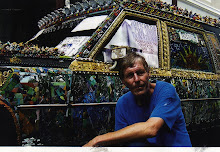Your average slave on a Louisiana sugar plantation was sentenced to ten years. Tops. After that, he was dead. Used up. Alarmed at the rate of attrition, plantation owners set out to impregnate as many slave women as they possibly could, often selling their own children to offset the expenses of their lavish, aristocratic lifestyles.
Yet, the need was immediate, and, being suspicious of foreign slaves from the Caribbean, thought it safer to purchase them from Virginia, slaves who had, incidentally, become Protestantized, so to speak, and therefore knew how to sing four-part harmony, thus providing a part of the basis for what was to become the music of the Delta: the Blues.
Note: The British East Indies Company ran the entire plantation system; providing slaves for their colonial puppets: Spain, France, Portugal, and others. The Brits (or Brutes) backed the Confederacy of the fascist Jefferson Davis, and had plans to extend their slave empire all the way into Mexico.
Further note: Their other principle commodity back then was opium, and that continues to this day. Now think: we're fighting insurgents funded by the opium trade in Afghanistan. Wouldn't it make sense to just bomb the opium fields and put them out of business? Is it becoming McChrystal clear by now?
Sunday, April 25, 2010
Sunday, April 18, 2010
The practice of voodoo (as popularized in the recent Disney trash hit) was the result of a bunch of guys from all over Africa, thrown together on a tiny island, and sentenced to harvesting tobacco for French nicotene addicts. Life without parole.
Needless to say, they had different languages, diets, rituals, and of course, forms of musical expression. Somehow, they managed to cobble together a culture called vou-dou, a gumbo of traditions, accompanied by plaintive, lyrical melodic forms from the Islamic North, and mixed with complex poly-rhythms of the Bantu, which, to the untrained ear, might sound like a guy falling down the stairs with a bunch of pots and pans.
The island was San Domingue, which later became the Republic of Haiti, after a British-led slave insurrection sent the French and their entourage of quadroon mistresses packing. They embarked to La Espanol (now Cuba), where they discovered a drug even more addictive than tobacco, namely, sugar, which they brought to the northern-most point of the Caribbean slave-trade, Nouvelle Orleans.
Needless to say, they had different languages, diets, rituals, and of course, forms of musical expression. Somehow, they managed to cobble together a culture called vou-dou, a gumbo of traditions, accompanied by plaintive, lyrical melodic forms from the Islamic North, and mixed with complex poly-rhythms of the Bantu, which, to the untrained ear, might sound like a guy falling down the stairs with a bunch of pots and pans.
The island was San Domingue, which later became the Republic of Haiti, after a British-led slave insurrection sent the French and their entourage of quadroon mistresses packing. They embarked to La Espanol (now Cuba), where they discovered a drug even more addictive than tobacco, namely, sugar, which they brought to the northern-most point of the Caribbean slave-trade, Nouvelle Orleans.
Subscribe to:
Posts (Atom)
